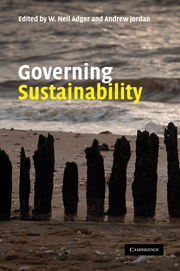Book contents
- Frontmatter
- Contents
- List of figures
- List of tables
- List of contributors
- List of abbreviations
- Foreword by Jonathon Porritt CBE
- Preface
- Part I Overview and Context
- Part II Governance and Government
- Part III Governance and Civil Society
- Part IV Governance and Decision Making
- Part V Conclusions
- 13 Reflections on the pathways to sustainability
- Index
- References
13 - Reflections on the pathways to sustainability
Published online by Cambridge University Press: 05 June 2012
- Frontmatter
- Contents
- List of figures
- List of tables
- List of contributors
- List of abbreviations
- Foreword by Jonathon Porritt CBE
- Preface
- Part I Overview and Context
- Part II Governance and Government
- Part III Governance and Civil Society
- Part IV Governance and Decision Making
- Part V Conclusions
- 13 Reflections on the pathways to sustainability
- Index
- References
Summary
We are now at an exciting stage in the awkward, but vital, transition to sustainability. In international government, in national strategies, in business, in community action, and in individual behaviour and outlook, we are beginning to witness a dawning realisation that global humanity has to shift if future generations are to survive with any meaningful sense of prosperity and wellbeing. We have no excuse about not knowing what may happen; modern science, the power of modelling and scenario building, together with the democratising effect of the internet, make any further denial impossible. We also know we have the global wealth and the technological wherewithal to change course if we have the will.
In this chapter, I start by summarising the major themes of this book. Then I look again at the morphology of the shift from the environmentalism of the 1970s to the rhetoric and politics of sustainability in the 2000s and beyond. My intent here is to show that we have not yet seriously completed this adjustment in paradigms, and that the environmental labelling of sustainability continues to plague its political acceptability and public empathy. In this section I also analyse why sustainability is such a slippery concept for governance. In part, this is because of its intensely ambiguous qualities. But I also claim that we have not yet devised governance arrangements that can resonate, promote and champion sustainability. The irony is that sustainability is supposed to be transformational.
- Type
- Chapter
- Information
- Governing Sustainability , pp. 307 - 328Publisher: Cambridge University PressPrint publication year: 2009
References
- 13
- Cited by



